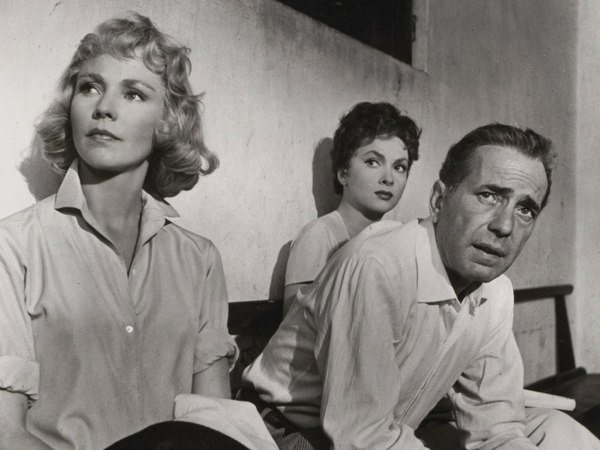
Dir.: John Huston; Cast: Humphrey Bogart, Jennifer Jones, Gina Lollobrigida, Edward Underdown, Peter Lorre, Robert Morley, Ivor Bernhard, Marco Tully; USA 1953, 95 min.
Beat the Devil is based on a novel by James Helwick, written by Claud Cockburn and a 28 year-old Truman Capote. What would become the first Camp movie, started out as an earnest endeavour about the evils of colonialism. But when the location was switched from France to Italy, with Capote writing the script in daily instalments, putting in a call to his pet raven in Rome, the narrative became secondary. Bogart had put his own money into the project but thought ‘only phoneys’ would like the box-office flop. Meanwhile, Huston told Jennifer Jones she would be remembered much longer for Devil than for her previous role in Song of Bernadette.
Billy and Maria Dannreuther (Bogart/Lollobrigida) and Harry and Gwendolyn Chelm (Jones/Underdown) play two couples down on their luck but pretending otherwise. They team up with four villains, O’Hara (Lorre) Peterson (Morley), Major Ross (Bernhard) and Ravello (Tully) to exploit uranium resources in British East Africa, biding their time in an Italian resort while their decrepit ship is made seaworthy. Then on the voyage to Africa, Major Ross tries to kill Harry, but Billy thwarts him. Once in Africa they are arrested by Arabian soldiers; Billy convincing the troops to send them back to Italian shores, where they are interrogated by Scotland Yard. The crooks are charged – Peterson for the murder of a British Colonial officer, who had discovered his scheme – Harry buys the land containing the uranium and sends a telegram to Gwendolyn, forgiving her for her affair with Billy.
There are some corny jokes, like the Major exclaiming “Mussolini, Hitler – and now Peterson” after the latter appeared to have been killed in a car accident. Overall the chaos of the shooting has a liberating effect in the finale, nobody grasping what was going on. Things are made murkier by the Hays’ Office insistence that no extra-marital sex should be shown on set. The grainy black-and-white images of British DoP Oswald Morris are very evocative, and the self-written dialogues by Morley and Lorre often hilarious. Ironically Beat the Devil looks more modern today than it did at the premiere when neither the public nor the critics saw the funny side of things. AS
BLURAY/DVD RELEASE | 16 MARCH 2020 WITH SIMULTANEOUS RELEASE ON BFI PLAYER, iTUNES and AMAZON